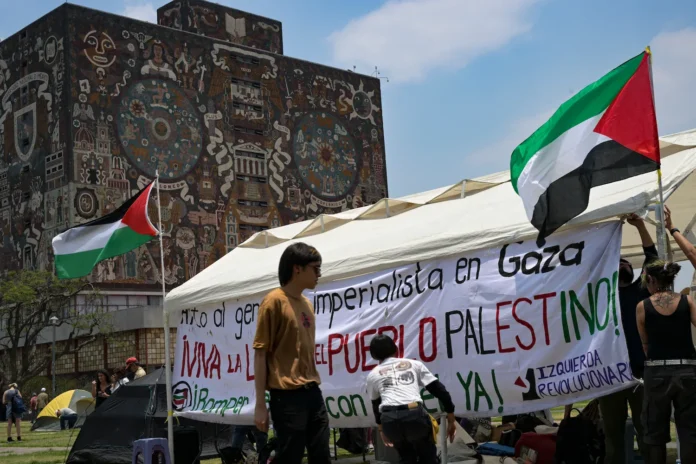Pro-Palestinian protesters erect a tent in front of the rectory building of the National Autonomous University of Mexico in Mexico City on May 2 to protest Israel’s attacks on Gaza.Yuri Cortez/AFP via Getty Images
Pro-Palestinian student protests like those seen in the United States in recent weeks have begun popping up at universities around the globe, including in Australia, Canada, France, Mexico, and the United Kingdom. Pro-Israel counterdemonstrations have also arisen in several places in response. Unlike in the United States, where more than 2,300 demonstrators have been arrested or detained across at least 49 campuses since April 18, international protests have largely faced minimal police interference.
Hundreds of people gathered at the University of Sydney in Australia on Friday to urge the school to sever academic ties with Israeli universities and divest from weapons manufacturers, a similar demand of many U.S. protesters. Vice Chancellor Mark Scott told local media on Thursday that the university’s encampment, which was set up last week, could stay on campus in part because it has not experienced the type of violence seen overseas and because “strongly held views and intense debates” are “part of who we are.” “Our instinct is never to pre-emptively shut down free speech and debate and the right to protest,” he said.
(A report released Thursday by the Armed Conflict Location & Event Data Project, a nongovernmental organization specializing in crisis mapping, found that despite “some notable violent clashes”—such as the one at the University of California, Los Angeles, where pro-Palestinian and pro-Israel demonstrators fought—99 percent of the U.S. protests have remained peaceful.)
Across the Pacific, dozens of pro-Palestinian students camped out at Mexico’s largest university on Thursday to call on the Mexican government to sever diplomatic and commercial ties with Israel. If Mexico City were to do so, it would become the fourth Latin American nation to cut diplomatic relations with Israel since the Israel-Hamas war began in October 2023. In Canada, Quebec Premier François Legault ordered students at McGill University on Thursday to dismantle their encampment after Canadian Prime Minister Justin Trudeau said “Jewish students do not feel safe” from the protests. Demonstrations have also been reported at schools in Beirut, London, Rome, and Tokyo.
Law enforcement has played an active role in quelling pro-Palestinian protests in France. Police entered Sciences Po university in Paris on Friday to remove students who had occupied campus buildings overnight; reports indicate that the French protests have remained peaceful, and eyewitnesses reported seeing no signs of violence as police took the students out of the Sciences Po buildings. The university closed its main site on Friday, and school director Jean Bassères rejected demands to review Sciences Po’s relationship with Israeli universities. French Prime Minister Gabriel Attal’s office said on Thursday that student protesters had been “evacuated” from 23 higher education institutions across the country.
Meanwhile, U.S. lawmakers are looking to mitigate campus unrest via legislation. The U.S. House of Representatives passed the Antisemitism Awareness Act by a 320-to-91 vote on Wednesday as part of a bipartisan effort to crack down on antisemitism on college campuses. This would be the first definition of antisemitism enshrined in U.S. federal law, and it could allow the Education Department to withhold federal funds from schools that fail to restrict antisemitic statements.
But pushback from both sides of the aisle makes the act’s passage in the Senate uncertain. Some Republicans have argued that the bill would outlaw parts of the Bible by criminalizing the claim that “Jews killed Jesus.” The Anti-Defamation League views that belief—which is held by some Christians, including some Republican lawmakers—to be an antisemitic trope that has for centuries been used to justify collective violence against Jews.
Democrats and First Amendment advocates, such as the American Civil Liberties Union, also condemned the bill, arguing that it could restrict political speech.
foreign policy




